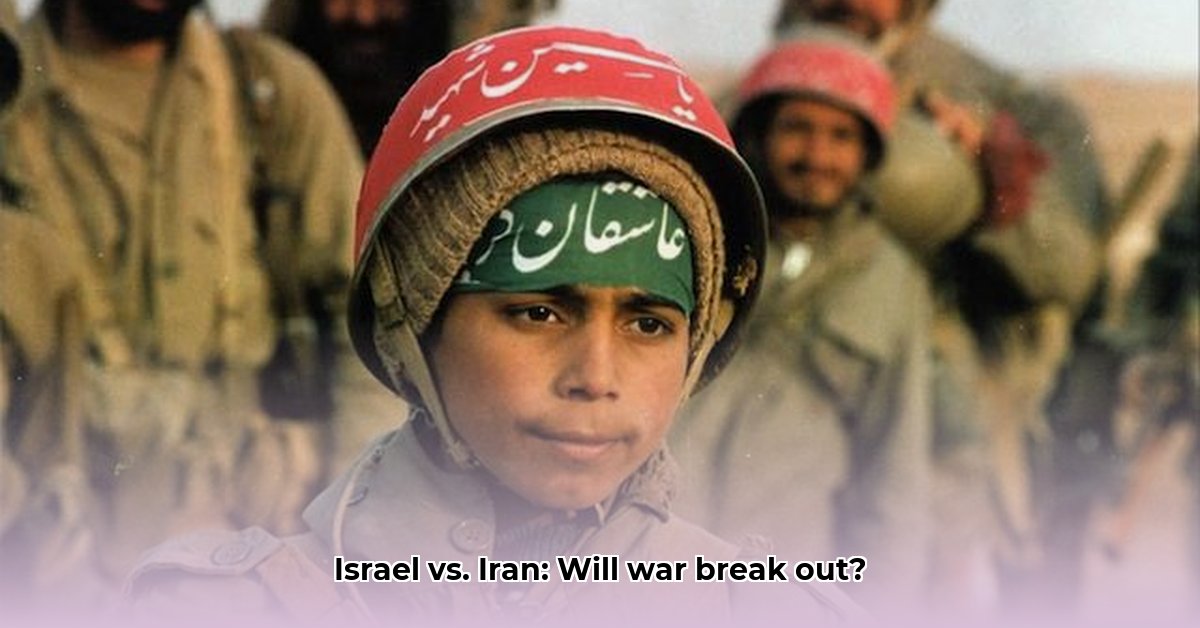Escalating tensions in the Middle East, particularly regarding Iran’s nuclear program, have raised concerns about a potential Israeli strike. This article explores the complexities of the situation, examining Iran’s nuclear ambitions, the differing viewpoints of the US and Israel, and the possible consequences of military action. We will delve into the potential outcomes of an Israeli strike, analyze the feasibility of nuclear negotiations, and identify strategies to prevent a wider conflict. Understanding the motives of all involved parties is essential to averting potential disaster. For more in-depth analysis, see this helpful resource on the US-Iran conflict: US-Iran War.
Nuclear Program Concerns and Geopolitical Ramifications
The possibility of war surrounding Iran’s nuclear program is a major concern, fueled by Israel’s stated willingness to attack Iranian nuclear facilities. Beyond the nuclear issue, regional dynamics play a critical role. The US approach to Iran’s uranium enrichment efforts will determine whether diplomacy or military action prevails. Iran’s insistence on maintaining uranium enrichment capabilities remains a significant obstacle to any agreement demanding complete cessation.
Disagreements and Uncertainties Intensifying Tensions
Reports indicate a high probability of an Israeli military strike, leading to questions about the US’s true intentions during negotiations. Is the goal a genuine agreement or a pressure campaign against Iran? Iran’s firm position on uranium enrichment, which it considers essential for its civilian nuclear program, further complicates diplomatic prospects. According to the Arms Control Association, these deeply entrenched positions significantly impede progress. The timeline for potential Israeli action remains unclear, dependent on the progress of US-Iran talks and regional developments.
Key Players and Strategic Goals
Iran and Israel’s intricate relationship has seen periods of cooperation, but is predominantly characterized by intense rivalry and proxy conflicts throughout the Middle East. An Israeli strike risks triggering a broader conflict, potentially drawing in regional actors. Given Iran’s heavily fortified, underground nuclear sites, the effectiveness and broader implications of any attack remain highly uncertain. It is unlikely that Iran will overly rely on China or Russia in this situation, given the nuances of current global affairs and existing alliances.
Potential Scenarios and Impact Assessment
Analyzing possible short-term and long-term scenarios helps in anticipating the impact on key stakeholders:
- US Government: In the short term, manage negotiations, navigate Israeli pressure, and prepare for potential regional instability. Develop a long-term, comprehensive strategy for addressing Iran’s nuclear program and regional activities, seeking international cooperation.
- Iran: Pursue limited diplomatic options in the immediate term, while focusing on domestic stability and economic resilience. Over the next 3-5 years, strive for a nuclear agreement balancing security and economic growth, while strengthening global partnerships.
- Israel: Closely monitor Iran’s activities, maintain military readiness, and exert influence on US negotiations in the short term. Develop advanced defensive capabilities and reinforce regional alliances in the long term to counter Iran’s influence.
- International Community: Immediately encourage de-escalation, provide humanitarian aid where needed, and uphold international law. In the longer term, facilitate peace talks, pursue multilateral solutions, and enforce consequences for any violations of international agreements.
De-escalation Strategies and Risk Mitigation
Mitigating the high risk of war requires a multi-faceted approach:
- Intensified Diplomacy: The international community must increase diplomatic efforts to encourage restraint and facilitate dialogue between all parties.
- Viable Nuclear Agreement: A mutually acceptable nuclear agreement is vital, addressing the legitimate concerns of all parties and ensuring long-term stability. “A verifiable and comprehensive nuclear agreement remains the best path to prevent Iran from acquiring a nuclear weapon,” stated Dr. Kelsey Davenport, Director for Arms Control Policy at the Arms Control Association.
- Contingency Planning: Develop robust emergency plans to address potential conflict scenarios and humanitarian crises, preparing for various potential outcomes.
- Open Communication: Establish and maintain open communication channels to de-escalate tensions and foster understanding between all parties involved.
- Confidential Negotiations: Facilitate discreet, behind-the-scenes negotiations to identify common ground, build trust, and explore potential compromises.
Legal Frameworks and Enforcement Mechanisms
Existing nuclear non-proliferation treaties and UN Security Council resolutions provide a vital legal framework. Military action by Israel or significant advancements in Iran’s uranium enrichment could trigger sanctions or international condemnation under these frameworks. The US’s imposition of sanctions intensifies the power struggle, with the potential for further economic pressure. This complex interplay of factors sustains a high risk of conflict, fueled by competing objectives and deep-seated mistrust.
Broader Regional Impact of Potential Israeli Military Action
An Israeli strike on Iran could derail nuclear negotiations and severely destabilize the region, with consequences far beyond the immediate targets.
Preemptive Action and Cascading Consequences
A preemptive strike by Israel would likely halt ongoing nuclear negotiations. Iran might respond with retaliation, accelerating its nuclear program or targeting Israeli interests, which would lead to a wider regional conflict involving entities such as Hezbollah and potentially the US.
Mitigating potential conflict depends on the scale of Israel’s action, Iran’s response, US involvement, and the reactions of other key regional and global players. The risk of accidental escalation is significant; miscalculations could rapidly escalate into a broader conflict.
Ramifications Beyond Nuclear Concerns
The impact extends beyond the nuclear issue, potentially destabilizing a region already facing complex, interwoven conflicts. Exacerbating existing tensions could reignite old regional disputes, impacting energy markets, trade routes, and global security.
Whether such action enhances or endangers Israel’s long-term security is hotly debated. While some argue it’s a necessary preemptive measure, others warn of potentially devastating consequences and unintended outcomes.
US Position in the Crossfire
The US faces a difficult challenge, balancing ongoing negotiations with Iran and its long-standing alliance with Israel. How will Washington respond to a unilateral Israeli strike? Support it, thereby escalating regional tensions? Or distance itself, potentially straining crucial diplomatic and strategic relations? The optimal approach to minimize conflict risk remains uncertain.
Navigating Uncertainty
Predicting the outcome of an Israeli strike is difficult. The long-term consequences are unpredictable, but the potential for widespread disruption is significant. The situation is highly sensitive, and any misstep could trigger severe consequences for all involved parties.
War Risk and US Sanctions
The ongoing tensions and recent events, including attacks and counterattacks, underscore the region’s volatility and the high stakes involved.
The Regional Impact
The actions of both sides have ramifications that extend beyond their borders, influencing the broader geopolitical landscape. The effectiveness of US sanctions on Iran plays a significant role in shaping the conflict’s trajectory.
Israel’s Response: A Calculated Decision
“Israel’s strategic calculus involves balancing the need for deterrence with the imperative of avoiding a full-scale war,” explains Dr. Sanam Vakil, Director of the Middle East and North Africa Programme at Chatham House. Israel’s decision-making process is influenced by the perceived effectiveness of US sanctions on Iran and the broader regional security environment.
US Role: Striking a Balance for Regional Security
The US seeks to balance providing intelligence and support to Israel with avoiding direct military intervention. Direct involvement carries the risk of escalating the conflict, while inaction could embolden Iran and further destabilize the region. The long-term implications of each course of action must be carefully considered.
Sanctions and Conflict Trajectory
The effectiveness of US sanctions on Iran is closely linked to the current tensions. These sanctions aim to limit Iran’s ability to fund proxy groups and advance its military capabilities. Evaluating the impact of sanctions on the conflict’s trajectory is critical for assessing the current risk level.
Uncertainties and Potential Scenarios
Predicting the future is challenging, with potential scenarios ranging from contained conflict to a broader regional war. The decisions made by key players will shape the conflict’s trajectory, underscoring heightened uncertainty and risk.
Regional Instability and Wider Conflicts
Escalating tensions between Israel and Iran pose a significant threat to regional stability. An Israeli strike on Iran could lead to uncontrolled escalation, potentially drawing in other regional powers and sparking wider conflicts.
The Domino Effect: A Fragile Peace
The escalating conflict represents a dangerous cycle of action and reaction. Despite periods of relative restraint, the delicate balance could be shattered by any misstep, such as a major Israeli strike on Iranian nuclear facilities. The possibility of a regional war demands careful attention.
Stakes Beyond Military Action
The conflict involves more than just military engagements. Iran’s network of proxy groups and Israel’s advanced military capabilities contribute to a highly volatile situation. A large-scale conflict would destabilize the region, creating conditions for wider, more dangerous confrontations.
Proxy War and Complications
Iran’s reliance on proxy forces complicates matters significantly. While responses from groups like Hezbollah have been measured, future actions are uncertain. Major escalation could ignite a proxy conflict, expanding the geographic scope of the fighting. Existing alliances and long-standing rivalries heighten the risk of a regional war.
Cascade of Consequences
The potential for regional war stems from the likelihood that a major Israeli strike could unleash a series of unpredictable events. Neighboring countries could become entangled, with spillover effects into other regional conflicts highly probable.
International Actors’ Roles
The US, Russia, and regional powers all have vested interests, and their actions will influence the likelihood of escalation. Conflicting objectives add complexity, but international mediation could help prevent a full-blown regional war, requiring all parties to act responsibly and exercise restraint.
A Path Forward?
Forecasting the future precisely is impossible, but analyzing contributing factors can provide insights into the fragile state of affairs. A comprehensive understanding is crucial for proactive conflict prevention, prioritizing de-escalation and diplomatic solutions.
- Cozy Hat Scarf Combos: Shop Now for Winter - June 15, 2025
- Jazz Band Instruments Guide: Master the Sounds in 7 Days - June 15, 2025
- Master Spoken Japanese: Jorden’s JSL Method - June 15, 2025
















